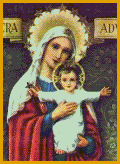 |
Resources
Our Lady of the Atonement Catholic Church |
..
|
Document establishing the Anglican Use
Addressed to:
His Excellency, the Most Reverend John R. Quinn
Archbishop of San Francisco
President, N.C.C.B.
Your Excellency,
The Congregation for the Doctrine of the Faith, in its Ordinary Session of June 18, 1980, has taken the following decisions in regard to the Episcopalians who seek reconciliation with and entrance into the Catholic Church.
I. General Decisions:
1) The admission of these persons, even in a group, should be considered the reconciliation of individual persons, as described in the Decree on Ecumenism Redintegratio Unitatis, n. 4, of the Second Vatican Council.
2) It will be appropriate to formulate a statute or “pastoral provision”
which provides for a t’common identity” for the group.
II. Elements of the “Common Identity”:
1) Structures: The preference expressed by the majority of the Episcopal Conference for the insertion of these reconciled Episcopalians into the diocesan structures under the jurisdiction of the local Ordinaries is recognized. Nevertheless, the possibility of some other type of structure as provided for by canonical dispositions, and as suited to the needs of the group, is not excluded.
2) Liturgy: The group may retain certain elements of the Anglican liturgy; these are to be determined by a Commission of the Congregation set up for this purpose. Use of these elements will be reserved to the former members of the Anglican Communion. Should a former Anglican priest celebrate public liturgy outside this group, he will be required to adopt the common Roman Rite.
3) Discipline: (a) To married Episcopalian priests who may be ordained Catholic priests, the following stipulations will apply: they may not become bishops; and they may not remarry in case of widowhood. (b) Future candidates for the priesthood must follow the discipline of celibacy. (c) Special care must be taken on the pastoral level to avoid any misunderstanding regarding the Church’s discipline of celibacy.
III. Steps required for admission to full communion:
1) Theological-catechetical preparation is to be provided according to need.
2) A profession of faith (with appropriate additions to address the points on which there is divergence of teaching between the Anglican Communion and the Catholic Church) is to be made personally by all (ministers and faithful) as a conditio sine qua non.
3) Reordination of the Episcopalian clergy, even those who are married, shall be allowed in accord with the customary practice, after the examination of each individual case by the Congregation for the Doctrine of the Faith.
IV. The statute or “pastoral provision” will not be definitive, but rather will be granted ad tempus non determinatum.
V. Particulars regarding the execution of the decision:
1) The contents of the statute or “pastoral provision” are to be determined with the agreement of the Episcopal Conference. In what concerns the liturgical aspects of the statute, the Congregation for the Sacraments and Divine Worship will be asked for its accord. The Congregation for the Doctrine of the Faith will keep informed of any developments both the Secretariat for Promoting Christian Unity and the Congregation for the Oriental Churches (the latter in view of the possible influence on the particular dispositions for ecclesiastical celibacy among Eastern-rite priests in the United States).
2) A Catholic ecclisiastical Delegate, preferably a Bishop, should be designated, with the approval of the Episcopal Conference, as the responsible person to oversee the practical application of the decisions here reported and to deal with the Congregation for the Doctrine of the Faith in what pertains to this question.
3) These decisions should be implemented with all deliberate speed in view of the waiting period already undergone by the Episcopalians who have presented this request.
These decisions were approved by His Holiness Pope John Paul II in the audience granted to the undersigned Cardinal Prefect of the Congregation on June 20, 1980.
The complexity of the above decisions, Your Excellency, recommends early contact between yourself and the Congregation in order to discuss the details and procedures for their implementation. Given your knowledge of the matter, it would seem ideal that, even after your term as President of the Episcopal Conference has expired, you might remain as Bishop Delegate (cf. V, 2) responsible for overseeing the admission of these persons into full communion with the Catholic Church. Permit me to express the hope that, if convenient for you, you will contact the Congregation for the purpose of initiating the necessary discussion of this question during your stay in Rome to participate in the 1980 Synod of Bishops.
Finally, I am enclosing a letter which I would be grateful to you for forwarding, after you have taken note of its contents, to Father John Barker of the Pro-Diocese of St. Augustine of Canterbury, informing him that their petition has been accepted in principle. Since you will be in the best position to know what publicity may be deemed unavoidable or suitable, I would like to leave in your hands the manner and timing of any communication about the fact or nature of the decisions here reported. I am sure you will have already noted in the decisions as reported a concern for the sensitive areas of ecumenism and celibacy.
You will no doubt want to inform Bishops Law and Lessard of the abovementioned decisions, since they were so closely involved in the negotiations during various phases. Since the group in question involves a certain number of English clergy and faithful, the Congregation will undertake to give the necessary information to the hierarchy of England and Wales.
With every best wish for Your Excellency, I remain
Sincerely yours in Christ,
/S/ Franjo Card. Seper, Pref.
| Our Lady of the Atonement Catholic Church | More Tracts |